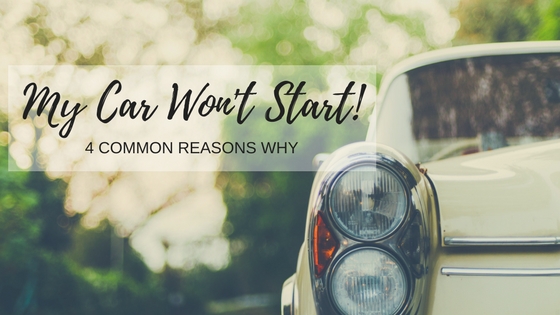Sometimes you don’t know what you’ve got til’ it’s gone.
If you’ve ever had to deal with your car not starting, you truly understand what this means.
We rely on our cars for a lot, and problems always seem to arise at the most inconvenient times.
When the day comes that it just won’t start, we realize just how much we take that reliability for granted. Read on to learn why vehicles sometimes don’t start, and a simple way to minimize the risk of it happening to you.
4 Common Reasons Why Your Car Won’t Start
While there are literally hundreds of possible reasons why sometimes a car won’t start, here are some of the more common problems that typically occur:
-
Battery Issues
Unfortunately, batteries don’t last forever! The average car battery lasts about 4 years, or less if maintenance is neglected. If your battery is dead, or even just weak, your vehicle won’t start. Lucky for you, this is usually a quick, simple fix!
For an engine to start and run effectively, all of the electrical connections must be clean and fitting snugly onto the battery connection. Loose connections or excessive corrosion around the battery terminals can hinder the battery from being able to transfer that electrical power in order to initiate a start. If you jump start the engine, the battery should recharge on its own while driving. If it doesn’t, your alternator could be the culprit.
-
Starter
If your battery is working fine, but when attempting to start your vehicle, all you hear is a clicking sound, this may be a problem with the starter. The clicking sound you hear is the solenoid within the starter rapidly engaging and disengaging.
-
Faulty Fuel Pump
The fuel pump controls the supply of fuel to the engine. Some fuel pumps get weaker and weaker over time, while some quit in seemingly an instant. If the right amount of fuel can’t get into the system at the right time and at the right pressure, the engine won’t start.
-
Clogged Fuel system or Fuel Injectors
If the fuel pump is still working properly but fuel is still not reaching the engine, the problem could be a clogged fuel system. A fuel system will clog up if dirt of other debris make their way into the fuel lines or fuel injectors. This can occur if you have a bad fuel filter. Replace your fuel filter every 10,000 – 12,000 miles or so to help prevent this from happening.
Want to lower the risk of being in a position where your car won’t start when you need it to? Keep your fuel system clean and efficient by using Berryman® B-12 Chemtool® Carburetor, Fuel System and Injector Cleaner. This product quickly disperses moisture and dissolves gum, varnish, and other fuel residues from the entire fuel system, fuel tank, fuel lines, fuel injectors, valves, rings and pistons. Regular use ensures higher compression, fewer repairs, lower operating costs, and increased spark plug and injector life.

